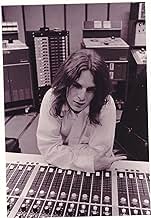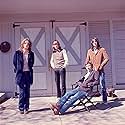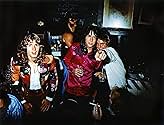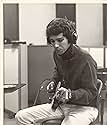IMDb RATING
7.1/10
1.5K
YOUR RATING
Big Star: Nothing Can Hurt Me is a feature-length documentary film about the dismal commercial failure, subsequent massive critical acclaim, and enduring legacy of pop music's greatest cult ... Read allBig Star: Nothing Can Hurt Me is a feature-length documentary film about the dismal commercial failure, subsequent massive critical acclaim, and enduring legacy of pop music's greatest cult phenomenon, Big Star.Big Star: Nothing Can Hurt Me is a feature-length documentary film about the dismal commercial failure, subsequent massive critical acclaim, and enduring legacy of pop music's greatest cult phenomenon, Big Star.
Lester Bangs
- Self
- (archive footage)
Chris Bell
- Self
- (archive footage)
The Box Tops
- Themselves
- (archive footage)
Panther Burns
- Themselves
- (archive footage)
Alex Chilton
- Self
- (archive footage)
Steve Cohen
- Self - U.S. Congressman
- (archive footage)
The Cramps
- Themselves
- (archive footage)
- Directors
- Writer
- All cast & crew
- Production, box office & more at IMDbPro
Featured reviews
As a voracious consumer of "Rock Docs," this one left me flat. The story is told in such a way that it is nearly impossible to follow (unless you are a Memphis super fan, I guess). It ambled along following every little thread until I just didn't care anymore.
As with "Mr. Blue Sky" (the Geoff Lynne doc), the superlatives flow like water. After a while, they just become meaningless.
And most important of all, I didn't leave this film and rush straight to ITUNES to download their work. If the music is as good as the interviewees bleated on about; they were not able to convey it within the film itself.
As with "Mr. Blue Sky" (the Geoff Lynne doc), the superlatives flow like water. After a while, they just become meaningless.
And most important of all, I didn't leave this film and rush straight to ITUNES to download their work. If the music is as good as the interviewees bleated on about; they were not able to convey it within the film itself.
BIG STAR: Nothing Can Hurt Me is a 2012 documentary about the eponymous 1970s pop-rock band from Memphis that saw few sales in spite of enormous critical acclaim, but went on to become a cult phenomenon and inspire some great bands in the decades that followed. The documentary was made without the participation of Big Star's surly frontman Alex Chilton (and it was completed following Chilton's untimely death), but it does feature interviews with bassist Andy Hummel, drummer Jody Stephens, and the musicians brought on when Chilton announced a new Big Star in the 1990s. Furthermore, producer John Fry appears throughout the documentary and appears to have had a bigger role in the Big Star story than many listeners might have imagined.
The film begins with the Memphis context of the late 1960s/early 1970s. Chilton, who had already had a chart hit with the band The Box Top and toured the country, comes home and starts a new band with Chris Bell. The process of recording Big Star's first album "#1 Record" is explained in some depth, from how the band used the available studio resources to where the iconic cover art came from.
We learn how Bell splits after the first album, has a nervous breakdown and flirts with evangelical Christianity, tries to make it as a musician in England and cuts the legendary single "You and Your Sister/I am the Cosmos", and finally dies in 1978 of a car crash at only 27 years old. There are poignant interviews with Bell's older brother and sister-in-law, but part of Bell's angst was his homosexuality, and everyone is uncomfortable even approaching this subject.
The documentary continues through the recording of Big Star's second ("Radio City") and third ("Third/Sister Lovers") records, followed by the ultimate breakdown of relations between Jody Stephens and Alex Chilton and the end of Big Star. There's some brief coverage of Chilton's solo career through the 1980s and the reformed Big Star in the 1990s and early millennium. There are some brief comments from later, perhaps more famous musicians that express an eternal debt to Big Star, like Teenage Fanclub and Mike Mills of R.E.M.
This is one of those documentaries that, to a degree, expects viewers to already know quite a bit about the band in question, making it somewhat frustrating for those who know Big Star's name and legacy but not so much the band's career and arc. It is mentioned that #1 Record sold poorly through label problems, but it's as if the viewer is already supposed to know that it was poorly distributed. It is mentioned briefly that Chris Bell died in a car crash, but with little detail. And there are some aspects of the production that seem mystery. For example, why does Jody Stephens have such a bad attitude throughout his interviews? Still, I enjoyed BIG STAR: Nothing Can Hurt Me overall. So many rock documentaries interview people who exploded into stardom, moved to la-la-land like California and seem to live on another planet compared to non-celebrities. Here, on the other hand, it's amazing just what ordinary southern Americans these people are, who clearly have some good memories of their youth but never really went for celebrity culture. They could be one's neighbours or the people you pass in the supermarket. That's not to say that they aren't interesting, as they include some quirky characters like the affably campy John King and producer Jim Dickinson's elderly but eternally young widow.
The film begins with the Memphis context of the late 1960s/early 1970s. Chilton, who had already had a chart hit with the band The Box Top and toured the country, comes home and starts a new band with Chris Bell. The process of recording Big Star's first album "#1 Record" is explained in some depth, from how the band used the available studio resources to where the iconic cover art came from.
We learn how Bell splits after the first album, has a nervous breakdown and flirts with evangelical Christianity, tries to make it as a musician in England and cuts the legendary single "You and Your Sister/I am the Cosmos", and finally dies in 1978 of a car crash at only 27 years old. There are poignant interviews with Bell's older brother and sister-in-law, but part of Bell's angst was his homosexuality, and everyone is uncomfortable even approaching this subject.
The documentary continues through the recording of Big Star's second ("Radio City") and third ("Third/Sister Lovers") records, followed by the ultimate breakdown of relations between Jody Stephens and Alex Chilton and the end of Big Star. There's some brief coverage of Chilton's solo career through the 1980s and the reformed Big Star in the 1990s and early millennium. There are some brief comments from later, perhaps more famous musicians that express an eternal debt to Big Star, like Teenage Fanclub and Mike Mills of R.E.M.
This is one of those documentaries that, to a degree, expects viewers to already know quite a bit about the band in question, making it somewhat frustrating for those who know Big Star's name and legacy but not so much the band's career and arc. It is mentioned that #1 Record sold poorly through label problems, but it's as if the viewer is already supposed to know that it was poorly distributed. It is mentioned briefly that Chris Bell died in a car crash, but with little detail. And there are some aspects of the production that seem mystery. For example, why does Jody Stephens have such a bad attitude throughout his interviews? Still, I enjoyed BIG STAR: Nothing Can Hurt Me overall. So many rock documentaries interview people who exploded into stardom, moved to la-la-land like California and seem to live on another planet compared to non-celebrities. Here, on the other hand, it's amazing just what ordinary southern Americans these people are, who clearly have some good memories of their youth but never really went for celebrity culture. They could be one's neighbours or the people you pass in the supermarket. That's not to say that they aren't interesting, as they include some quirky characters like the affably campy John King and producer Jim Dickinson's elderly but eternally young widow.
I went into the theater expecting a rock-n-roll documentary about a group I'd never heard of. I agree with many of the reviewers here that the film starts slowly and appears to want to convince me that this extraordinary ensemble just didn't get the break they needed. The point was pounded home time and again but, not being an big fan of rock-n-roll I felt the need of more evidence, until the story began to break about the individuals in the band and the emotional content of their work together and their lives. It was as if they all--with the exception of Chris Bell--assumed they'd get what they deserved, and too bad if that was less than it might be. Here is where the story begins to become intriguing, but the payoff is not complete.
I am the same age as the Beatles, roughly, and bought their albums and the mythology that went along with them. I admit I didn't know much more about rock-n-roll than that. If you'd ask me what the band who produced "The Letter" was I would probably have said The Monkees. In fact, the lead singer on that number was Alex Chilton, who became the central member of Big Star.
In the q-and-a after the showing of BIG STAR, the director revealed that much of the angst endured by Chris Bell had to do with homosexuality, and there is an area of silence around this facet his life when you are interviewing his family and remaining friends. The nugget of information would be crucial to the narrative of the band and explain to a degree why the film didn't fully work for me. I could tell Bell was difficult, tormented, and probably a genius--but what his demons were, and what his relationship with Chilton was, was not even hinted at. He seemed petulant and jealous that Chilton became the star of the group, but the level of disillusion, betrayal and pain didn't seem to come from anywhere.
The film made me think; it informed me of much I didn't know about the Memphis scene and rock-n-roll in the 70s, when I was off into folk and then into old-time pop music and jazz. I parted company with the mainstream but not to the degree Big Time did. Nevertheless it is interesting to learn about their path. Now that I know there is a great deal more to their story, I would love to hear that as well.
I am the same age as the Beatles, roughly, and bought their albums and the mythology that went along with them. I admit I didn't know much more about rock-n-roll than that. If you'd ask me what the band who produced "The Letter" was I would probably have said The Monkees. In fact, the lead singer on that number was Alex Chilton, who became the central member of Big Star.
In the q-and-a after the showing of BIG STAR, the director revealed that much of the angst endured by Chris Bell had to do with homosexuality, and there is an area of silence around this facet his life when you are interviewing his family and remaining friends. The nugget of information would be crucial to the narrative of the band and explain to a degree why the film didn't fully work for me. I could tell Bell was difficult, tormented, and probably a genius--but what his demons were, and what his relationship with Chilton was, was not even hinted at. He seemed petulant and jealous that Chilton became the star of the group, but the level of disillusion, betrayal and pain didn't seem to come from anywhere.
The film made me think; it informed me of much I didn't know about the Memphis scene and rock-n-roll in the 70s, when I was off into folk and then into old-time pop music and jazz. I parted company with the mainstream but not to the degree Big Time did. Nevertheless it is interesting to learn about their path. Now that I know there is a great deal more to their story, I would love to hear that as well.
10cebelina
Lovely, poignant and beautiful the story of Big Star is fraught with the inescapable trappings of life that both manage to bind and also free us. There is already a wonderful review by David Ferguson. His review sums up much of what you'd actually expect to find on the liner notes of a DVD compilation release of this movie. And he's spot on. My review won't add or be any better. In the end my review will only add a bit of the haunting beauty and power that was Big Star and that lingers with us. A black diamond glimpse into the souls of not only Big Star but each and every one of us. A cautionary song/tale that sums up much of what I think the movie offers: "Take care not to hurt yourself Beware of the need for help You might need too much And people are such Take care, please, take care Some people read idea books And some people have pretty looks But if your eyes are wide And all words aside Take care, please, take care. This sounds a bit like goodbye In a way it is I guess. As I leave your side. I've taken the air. Take care, please, take care. Take care, please, take care." Wm Alexander Chilton
Really bored this evening and decided to watch this documentary which turned out to be both tragic, and heartwarming....bittersweet. It was just heartbreaking to see their journey, with big dreams and great material, turn into their broken dreams which would later inspire thousands of fans and dozens of musical acts. Really beautifully done.
Did you know
- GoofsWhen listing current artists that were influenced by Big Star, Elliott Smith is seen introducing a Big Star cover song on the Jon Brion Show with the date 1996. The show was not recorded until 2000.
Details
- Release date
- Country of origin
- Official sites
- Language
- Also known as
- Большая звезда: Ничто не может причинить мне боль
- Filming locations
- Production companies
- See more company credits at IMDbPro
Box office
- Gross US & Canada
- $105,998
- Opening weekend US & Canada
- $15,096
- Jul 7, 2013
- Gross worldwide
- $105,998
- Runtime
- 1h 53m(113 min)
- Color
- Aspect ratio
- 1.78 : 1
Contribute to this page
Suggest an edit or add missing content






























